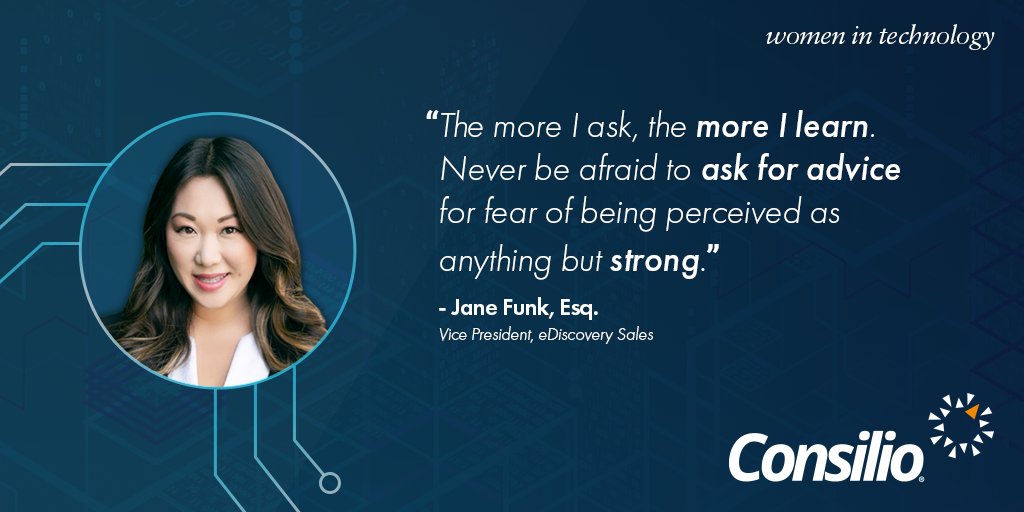 This blog is part of our ongoing Women in Technology series.
This blog is part of our ongoing Women in Technology series.
Jane Funk, Esq. is a VP and Shareholder for Xact Data Discovery, which recently merged with Consilio. Jane is a former practicing litigation attorney. For the past 12 years, Jane has successfully worked with in-house corporate legal departments and law firms to design and implement legally defensible and cost-effective processes for collecting, processing, managing review reviews, and producing electronically stored information (ESI) utilizing AI technology. Additionally, Jane assists her clients with non-litigious legal data initiatives, including M&A Due Diligence, Data Privacy, Cyber Security, Government, Internal Investigations, Bankruptcy, and Contracts Review. At Consilio, Jane is responsible for managing relationships with a portfolio of strategic accounts spanning numerous highly regulated industries. In addition, she is responsible for driving value-based business development strategies specific to the Pharmaceutical vertical. Jane draws upon her litigation experience and her 14+ years of legal experience to put her clients’ needs first.
How did you get into this industry?
When I graduated from law school and started working as a litigation associate, I quickly realized that discovery was the largest area of spend and, in turn, the biggest concern to my clients. My clients came to me for advice on the best and most efficient processes to streamline the daunting task of weeding through data. I loved the idea of being a data problem firefighter and helping my clients navigate the process. The opportunity to consult and be a holistic problem solver for my clients made me want to join the ranks of recovering litigators and enter the legal tech industry.
What were some pivotal moments in your career that helped to get you to where you are today?
The best compliment I ever received was from a client who described me as „appropriately persistent“ in my negotiations with opposing counsel. His compliment resonated with me because it confirmed that I rightfully trusted my gut of standing my ground, but not at the expense of being too pushy. Since that day, I have adopted the „appropriately persistent“ approach to all aspects of my internal and external professional endeavors.
Have you ever noticed a time in your career where your gender proved to differentiate you?
I am often the only woman in a room filled with men. Early in my career, I found myself taking a backseat to most men. I feared that I didn’t have as much industry knowledge, that I wasn’t as experienced, or that I wouldn’t be taken as seriously as them. For example, my team was asked to present our litigation services for an AmLaw20 firm one day. Although I had set up the meeting and held the key relationships at the firm, I deferred to my team and my more tenured male colleague to lead the presentation. 15 minutes into that presentation, the leading female, African American, and LGBTQ partner stopped him mid-sentence. She said, „I appreciate what you have to say. However, I would like to hear from your female colleague now.“ That moment was the first time I felt empowered as a female and as a minority to step up and take the lead. She not only provided me a seat at the table, but she enthusiastically ushered me into the seat. That gesture from an influential and extraordinary female leader was the empowerment and confidence that I needed to stop doubting my capabilities as a woman. I now offer that same seat at the table and ushering to other females who may otherwise go unnoticed.
What is your advice for someone working in a predominately male workplace?
Whether you are a woman or a man, demonstrating vulnerability and seeking advice are professional assets, not detriments. When I first joined the legal tech world, I was reluctant to ask questions or seek advice because I thought I would be perceived as weak or incompetent. Now, having been in the industry for many years, I have realized that the best leaders and strongest colleagues aren’t afraid to show their vulnerability and ask for help when they need it. Vulnerability and the desire to learn more are what make us better humans and professionals. The more I ask, the more I learn. Never be afraid to ask for advice for fear that you’ll be perceived as anything but strong.
What do you think companies could do to motivate more women to pursue careers in technology?
Women are often faced with a choice in their careers: be a mom or be a professional. Rarely are there opportunities for women to do both. In one of my prior roles, when I returned from maternity leave after having my first child, I requested a mentor who could guide me in navigating life as a new working mom. Unfortunately, despite working at a large company, the company found ZERO women in my field who were both 1) a professional and 2) a mom. It was mind-blowing. They couldn’t find me a mentor because there wasn’t a single person who successfully balanced both roles. It was a major red flag and signaled a big area of opportunity in technology and other industries. If companies would make more accommodations and flexibility, as a rule, and not as an exception, for working moms and all working parents, more women would likely feel motivated to work in the industry.